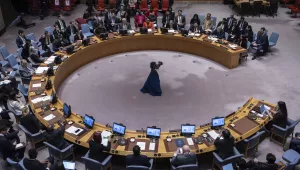NEW YORK -- Amidst the dancing, smiling and tears of joy in much of America, there is also deep awareness of how hard it will be for Barack Obama's administration to fix the multiple messes at home and abroad that it inherits from George W. Bush. A key to success will be for Obama to recognize quickly that he stands before an opportunity similar to that which Bush had on September 12, 2001 -- to harness massive, almost unquestioning, domestic and global support for the American president in facing a very serious threat in the wake of a traumatic experience.
The trauma of 9/11 was a criminal terror attack against the United States, while today it is a collapsing global economy and assorted international tensions. Heightened emotions -- whether today's joy or 9/11's anger -- should not be allowed to cause otherwise sensible people to make wrong decisions by misreading how they interact with the world.
George W. Bush and his band of zealots used the anger-based emotional high after 9/11 to simultaneously misdiagnose themselves, their enemies, their friends and their place in the world. Consequently, they pursued catastrophic domestic and foreign policies. Obama must beware such pitfalls. He and his senior officials must understand more accurately how the United States and the world actually interact, in good times or bad, in order to forge policies based on credible analyses that are free of self-congratulatory emotionalism or pride.
All Americans rightly enjoy this well deserved moment of celebratory joy, reflecting the political acumen, moral fortitude, and vibrant democracy that have given us a President Obama. Americans will need the renewed self-confidence in order to aim high to resolve the enormous problems and challenges ahead, and not to be intimidated by their own foibles or the crimes of foreign terrorists.
Americans have a self-satisfied glow on their faces because they have banished the demons of their native racism against their own Black citizens. They are admired because they demonstrated again the real power and genius of the democratic process, exercised in an environment of freedom.
Here is the essential point that Obama and his foreign policy officials must grasp quickly, and hold on to tightly: American democracy and related domestic values are not the same as American foreign policy. The world did not hate the United States for its freedom in 2001, and will not love it for its democracy in 2008. Let us banish these simplistic worldviews forever, and start anew. Now is the time to grasp the critical interaction among three separate things that are deeply intertwined -- American values, American foreign policy, and the world's views of the United States.
In Boston and New York this week, I have already read and heard some comments to the effect that many people around the world who criticize or even "hate" the United States will now change their mind, because they now see the real heart of America in action -- opportunity, goodness, tolerance and genuine equality. This risks repeating in 2008-09 the same mistakes that fearful and confused Republicans made in 2001.
Those huge majorities of people around the world who criticize the United States do so primarily because of the impact of Washington's foreign policy on their lives and societies. Not only are they not criticizing American values such as democracy; in fact they keep coming to the United States, often illegally, to live in a society defined by those values. They aspire to American-style democratic elections and anti-discrimination laws and policies in their own countries.
But they also see and feel a direct connection between their own autocratic or even dictatorial regimes and the support of the United States and other Western powers, sometimes going back 30 or 40 years. While admiring democratic freedoms, prosperity and stability inside the United States, they wonder why they and others suffer from an American power and policies that support dictatorships, and promote violence, instability and pauperization. American core values and foreign policy ideally should reflect the same principles, but in practice they often are two very different things.
Obama now has an extraordinary opportunity: to realign American domestic and foreign values, and thus to reconnect the United States with the world. He can build on the recently demonstrated uplifting and best traditions of America that have brought him to the White House.
The convergence between his country's traditions and the developing world's aspirations stands before him now like a three-point basketball shot that can seal his - and so many others' -- victory. It is a shot he is capable of making, if he dispassionately and accurately analyses his position, the playing field around him, and the real balance between his friends and foes.
This is a moment for Americans to dance with joy, but also to think straight about themselves and their foreign policy, and about the world out there that wants passionately to dance with them.
Rami G. Khouri is Editor-at-large of The Daily Star, and Director of the Issam Fares Institute for Public Policy and International Affairs at the American University of Beirut, in Beirut, Lebanon.
Khouri, Rami. “Joy in America.” Agence Global, November 10, 2008




